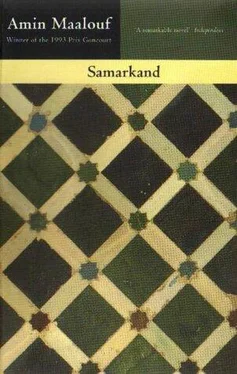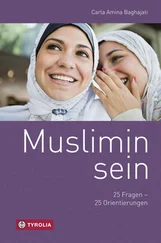Three women, a garden and a salutary misunderstanding — I could recount forever those forty unreal days of a sweltering Persian spring. It was difficult being a foreigner; I found it doubly awkward in the world of oriental women where I did not belong at all. My benefactress was well aware of the difficulties into which she had been thrown. I am certain that the whole of the first night, while I was sleeping stretched out on all three mats laid on top of each other in the cabin at the bottom of the garden, she was the victim of the most intractable insomnia for at dawn she summoned me, had me sit cross-legged to her right, sat her two daughters to her left and gave us a carefully prepared speech.
She started by hailing my courage and restated her joy at taking me in. Then, having observed some moments of silence, she suddenly started to unhook her bodice before my startled eyes. I blushed and turned my eyes away but she pulled me towards her. Her shoulders were bare and so were her breasts. With word and gesture she invited me to suckle. The two daughters giggled under their cloaks but the mother had all the solemnity of a ritual sacrifice. I complied, placing my lips, as modestly as possible, on the tip of one breast and then on the other. Then she covered herself up, without haste, adding in the most formal tones:
‘By this act you have become my son, as if you were born of my flesh.’
Then, turning towards her daughters, who had stopped laughing, she declared that henceforth they had to treat me as if I was their own brother.
At the time the ceremony seemed both moving and grotesque to me. Thinking back over it, however, I can see in it all the subtlety of the Orient. In fact my situation was embarrassing for that woman. She had not hesitated to hold out a helping hand to me at great peril to herself, and she had offered me the most unconditional hospitality. At the same time, the presence of a stranger, a young man, near her daughters night and day, could only lead to some incident at some point in the future. How better to diffuse the difficulty than by this ritual gesture of symbolic adoption. Then I could move around the house as I pleased, sleep in the same room, place a kiss on my ‘sisters’ ’ foreheads and we were all protected and kept strictly in check by the fiction of adoption.
People other than me would have felt trapped by this performance. I, on the contrary, was comforted by it. Having landed up on a women’s planet and then to form a hasty attachment, through idleness or lack of privacy, with one of the three hostesses; to try bit by bit to edge away from the other two, to outwit and exclude them; to bring upon myself their inevitable hostility and to find myself excluded — sheepish and contrite at having embarrassed, saddened or disappointed the women who had been nothing less than providential — that would have been a turn of affairs which would not have suited my nature at all. Having said that, I, being a Westerner, would never have been able to come up with the solution which that woman found in the never-ending arsenal of her religious commandments.
As if by a miracle, everything became simple, clear and pure. To say that desire was dead would be telling a lie, everything about our relationships was eminently carnal yet, I reiterate, eminently pure. Thus I experienced moments of carefree peace in the intimacy of these women who were neither veiled nor excessively modest, in the middle of a city where I was probably the most wanted man.
With the passage of time, I see my stay with those women as a moment of privilege without which my attachment to the Orient would have remained short-lived or superficial. It is to them I owe the immense steps I made in understanding and speaking idiomatic Persian. Although my hostesses had made the praiseworthy effort to put together some words in French on the first day, all our conversations were henceforth carried on in the country’s vernacular. Our conversations might be animated or casual, subtle or crude, often even flirtatious, since in my capacity as elder brother anything was allowed as long as I stayed beyond the bounds of incest. Anything that was playful was permitted, including the most theatrical shows of affection.
Would the experience have kept its allure had it gone on for longer? I shall never know. I do not wish to know. An event which was unfortunately only too foreseeable put an end to all that. It was a visit, a routine visit, by the grandparents.
Ordinarily I stayed far away from the entrance gates, the birouni gate, which led to the men’s abode and was the main doorway, and the garden gate through which I had entered. At the first sound I would slip away. This time through recklessness or over-confidence, I did not hear the old couple arrive. I was sitting cross-legged in the women’s room and for the last two hours had been peacefully smoking a kalyan pipe prepared by my ‘sisters’ and had fallen asleep there with the pipe still in my mouth and my head leaning against the wall, when a man’s cough woke me up with a start.
For my adoptive mother, who arrived a few seconds too late, the presence of a European male in the interior of her apartments had to be promptly explained. Rather than tarnish her reputation or that of her daughters, she chose to tell the truth in the most patriotic and triumphant way she could. Who was this stranger? None less than the farangi the police were looking for, the accomplice of the man who had cut down the tyrant and avenged her martyred husband!
There was a moment of indecision and then the verdict came. They congratulated me and praised my courage as well as that of my protectress. It is true that confronted with such an incongruous situation her explanation was the only plausible one. Even though the fact that I had been slumped out right in the middle of the andaroun was somewhat compromising, she could easily have explained it away by speaking of the necessity of shielding me from sight.
Honour had been safeguarded, but it was now clear that I had to leave. There were two paths open to me. The most obvious was to leave disguised as a woman and to walk over to the American legation; in short, to complete the interrupted walk of a few weeks earlier. However, my ‘mother’ dissuaded me. Having carried out a scouting expedition she had discerned that all the alleys leading to the legation were being watched. Moreover, being rather tall at just over six feet, my disguise as a Persian woman would not fool even the most unobservant soldier.
The other solution was, following Jamaladin’s advice, to send a distress message to Princess Shireen. I spoke of her to my ‘mother’ who gave her approval; she had heard of the assassinated Shah’s grand-daughter who was said to be sensitive to the suffering of the poor and she offered to carry a letter to her. The problem was finding the words with which to address her — words which, while being sufficiently explicit, would not give me away were they to fall into other hands. I could not mention my name, nor that of the Master. I made do with writing on a sheet of paper the only phrase she had ever said to me: ‘You never know, our paths might meet!’
My ‘mother’ had decided to go up to the princess at the ceremonies on the fortieth day of the death of the old Shah, the last stage of the funeral ceremonies. In the inevitable general confusion of the onlookers and the professional weepers smeared with soot, she had no difficulty in slipping the paper from her hand into the princess’s, who then read it and with dread looked about her for the man who had written it. The messenger whispered to her: ‘He is at my house!’ Immediately Shireen left the ceremony, summoned her coachman and placed my ‘mother’ at her side. In order not to attract any suspicion, the coach with the royal insignia stopped in front of the hotel Prévost from which spot the two heavily veiled and anonymous women continued their route on foot.
Читать дальше












